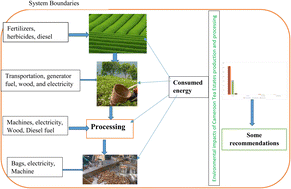Analysis of environmental sustainability of Cameroon tea production: an LCA study
Abstract
Tea has received a lot of attention over the past few decades as the second most consumed beverage in the world after water. Due to the complex nature of tea cultivation and its high production and consumption intensity, concern over its environmental impact is warranted. This study consists of assessing the environmental sustainability of tea cultivation, harvesting and processing as a case study, based on the Cameroon Tea Estates company. The life cycle methodology (LCA) at the screening level is applied to identify critical hotspots to allow for the reduction of environmental impacts associated with tea production in Cameroon. The company “Cameroon Tea Estates”, which is the first national tea production company, was proposed as a case study. Data were collected through face-to-face questionnaires with the company's employers. SimaPro software version 9.1.1.1, the Ecoinvent database v.3.6 and the ReCiPe Midpoint (H) (2016) method were used for the assessment. All 18 impact categories from the ReCiPe method were included in assessing the environmental impacts of tea production. According to the results, reported for 1 ha of cultivation as a functional unit, the global warming potential gives a total value of 34 kg CO2 eq. The most affected impact categories include freshwater ecotoxicity, marine ecotoxicity and human carcinogenic toxicity potential with normalized impacts amounting respectively to 120 × 10; 80 × 10 and 20 × 10 were associated with the use of nitrogen fertilizers and pesticides in the agricultural phase. The typical hotspots are packaging material, herbicides, fertilizers and wood for energy purposes. The results of the flux replacement scenarios showed an attenuation of these hotspots of the order of 95%, 83%, 99% and 98%, respectively. The results of this study draw up an inventory of environmental benefits linked to tea production in Cameroon, which can be considered as the very first regulatory database for this sector, which plays an important role in the country's economy.



 Please wait while we load your content...
Please wait while we load your content...